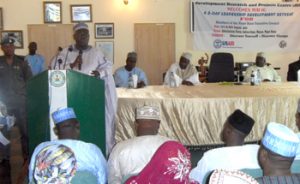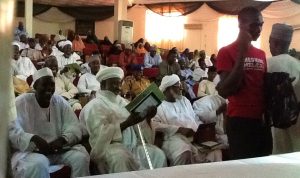
The Centre views the area of advocacy in RH/FP as an important issue of health governance. Through its advocacy programs we seek to improve RH/FP outcomes by increasing capacity of civil and professional stakeholders (CAPS) in the health sector to advocate for improved services and increased budgetary allocation. The Centre also seeks to expand the capacity of government officials and policy makers to respond to advocacy demands by CSOs by increasing officials’ understanding of the participatory policy making process, improving skills to respond through gender based budgeting training and by facilitating policy dialogues on RP/FP. We therefore work on both the demand and supply sides of the health governance equation to expand capacity for participatory health policy making and implementation.
Demand side capacity building for improved RH/FP outcomes
On the demand side we work with stakeholders (for example, community based organizations, NGOs, faith based organizations, the media, leaders of faith communities and associations of health workers) to track health budgets, demand for increase allocation and expenditure in health, establishment of a reproductive health budgetary head and monitor the performance of free maternal health services programs and laws. This is critical work on the demand side which few organizations are doing currently.
The core activities which run throughout all advocacy programs on the demand side are:

- Capacity building training for carrying out high impact evidence based advocacy using an adapted Spitfire Advocacy Model
- Coalitions and networking skills building training for a diversity of CAPS (the media, traditional and religious leaders, NGO etc) to work together for improved FP/RH outcomes
- Capacity building for budget tracking
- Leadership development for executives of civil and professional stakeholders in the health sector
- Sub-granting to CAPS and their coalitions to carry out advocacy engagements
- Identification and strengthening of civil and professional stakeholders in the health sector to step down advocacy and leadership training to their membership and at community level to ensure sustainability
Strategies to ensure the effectiveness of demand side activities
To ensure the effectiveness of demand side activities, we use the following strategies:
- The Islamic position on child spacing and family planning is directly addressed in training workshops through trainers who are Islamic opinion leaders. The Islamic Opinion leaders who are lead trainers have been supported to attend a study tour of the Institute of Training and Research in RH in collaboration with the Public Health Institute, International Health Programs.
- In the advocacy coalition building strategies, dRPC encourages, coalitions to incorporate Islamic scholars, traditional leaders and the media as members of advocacy teams as they lend legitimacy to advocacy demands.
- Leadership development is linked to advocacy capacity building and is a core topic in dRPC capacity building trainings
- Civil society and professional stakeholders in health have their capacity built in the area of budget literary, public finance and responsibilities of local, state and federal government in the health system.
Supply side capacity building activities carried out by the Centre
On the supply side, the Centre engages with government officials and political office holders to strengthen their capacity to respond to advocacy demands by CAPS. Core activities carried out on the supply side are:
- Capacity building in gender analysis and gender based budgeting
- Capacity building training on leadership development for the transformation of the RH/FP crisis in Nigeria
- Study tours to Muslim countries as well as to neighboring countries such as Ghana to understudy best practices
- Technical assistance to public officials to implement individual and state action plans in RP/FH
- Mentoring of senior civil servants and political office holders
- Policy dialogues between senior civil servants/political office holders and civil society and professional organizations

Strategies for supply side capacity building amongst senior civil servants and political office holders
- Senior civil servants and political office holders are encouraged to take responsibility for transformation of the RH/FP crisis of their states by developing individual and state action plans
- Mentoring and technical assistance to senior
- Participatory training methods which are engaging and non-didactic are used in training workshops
- Builds partnerships with leading government agencies such as the National Institute for Policy and Strategic Studies, NIPSS, to jointly conduct training workshops
- Leadership development is used as a strategy to catalyze a process in which political office holders take responsibility for the crisis of RH/FP in their states
dRPC Advocacy for RH/FP projects
- Leadership Development for Reproductive Health/Family Planning of State Political Office Holders (Legislators, Executive, Judiciary, Local Government Chairmen) in Niger, Sokoto and Zamfara States, 2009-2010 supported by USAID Nigeria through a Cooperative Agreement with World Learning
- Leadership Development for Reproductive Health/Family Planning of traditional and religious leaders in Niger, Sokoto and Zamfara States, 2009-2010 supported by USAID Nigeria through a Cooperative Agreement with World Learning
- Advocacy for Reproductive Health/Family Planning in Northern Nigeria, Phase II, supported by the David and Lucile Packard Foundation, 2009-2010
- Advocacy for Reproductive Health/Family Planning in Northern Nigeria, Phase I, supported by the David and Lucile Packard Foundation, 2006-2008
- Advocacy for Gender based budgeting in Bauchi State, 2003-2004, supported by the Canadian International Development Agency, CIDA
- Advocacy for Women’s Rights in Northern Nigeria, 2003-2004, Henrich Boll Foundation, Germany
- Advocacy for continuation of the Free Maternal Health Services program in Kano State, 2003, supported by the MacArthur Foundation
- Leadership Development for the Mobilization of RH/FP, sub-grant from the Institute of International Education, under a grant from the David and Lucile Packard Foundation, 2002-2011

